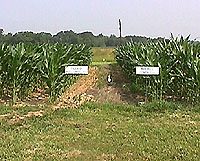Soil Compaction Can Cause Yield Losses
Soil Compaction Can Cause Yield Losses

With more and more farmers using conservation tillage practices with little or no tillage, there has been a question of it compacting the soil and what that subsequently means to crop yields.
An ongoing research project at the University of Kentucky's Research and Education Center is investigating the question.
The study began in 1996 and is looking at tilled and no till plantings in these research plots. The research has also allowed for further testing of penetrometers, a machine used to measure compaction.
The research shows that yields in tilled and no-tilled fields are significantly reduced because of compaction. But the research shows no till fields tend to correct many problems caused by compaction within three to five years.
Yields in no-tilled plantings are greatly reduced because of compaction in the first year after compaction takes place but will rebound rapidly without tillage, due probably to a high rate of biological activity in the root zone, said Lloyd Murdock, Extension soils specialist.
After several years, no-tilled planting into compacted soils yielded as well as or exceeded planting in noncompacted tilled plots.
The compaction still affects the crop but not much, Murdock said. What his research has discovered is that the compacted barrier is being modified by ants, worms, root growth and biological activity. There are changes taking place in the soil structure in the no till compacted field but not in the tilled compacted plots at the research center.
Zones can be found about the size of a person's little finger in the compacted area allowing for better root development and water flow.
"A lot of Kentucky farmers use no till and like no till but are concerned about compaction and feel the need to deep till every second year with a tillage method that generally leaves the crop residue on top," Murdock said.
But they have not seen any real boost in yields after doing so and may not be needed, based on Murdock's research.
No till farming was first began as a conservation practice but time is showing it to have other benefits as well, Murdock noted.
He thinks one of the secrets to high yields in no till fields is this biological process.
While a no till advocate, Murdock says there is a time when tilling is needed such as to smooth the surface. But when the soil is mixed with tilling, the biological process is interrupted and has to start over again.
"It's been my observation that tillage is done out of emotion and not based on scientific knowledge," he said. "It makes them feel good, first because they are doing something and second, because it is something they have done in the past."
Murdock said the research will be ongoing and he'd like to see how long it takes the conventionally tilled, compacted field to ameliorate itself. But he's not sure how long that will take.
